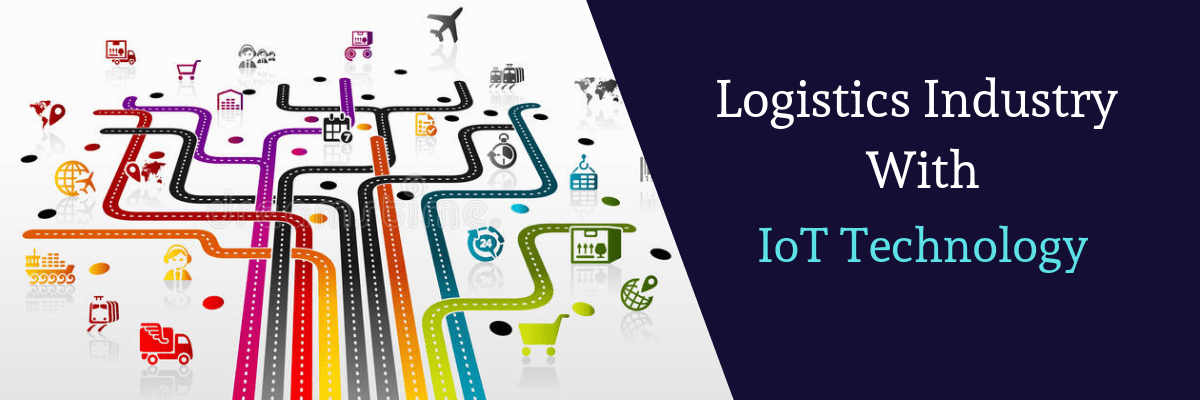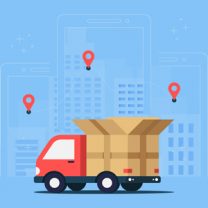Transform your Logistic Industry with Booming IoT Technology for Hypersonic Business Growth
IoT has taken the world by storm since it was invented in 1999. While it has not reached its full potential, it is growing at a fast rate and living up to the hype.
Logistic companies are embracing IoT technology to streamline their business processes and reduce visibility. With many companies like OHL and Cargotec experiencing the benefits, its time other logistic companies jump on the bandwagon and transform their businesses.
But where is this technology headed?

What Is the Future of IoT?
The term ‘Internet of things’ was first coined by Kevin Ashton in 1999. Today, IoT has become a reality, and we have seen its application in transportation systems, robotics as well as manufacturing processes.
According to Ashton, the value of IoT is expected to grow every year. He further says that although IoT is over? years in, it’s not even 17% done yet.
Predictions also point that the growth of IoT is expected to experience hypersonic growth and reach 50 billion objects by the year 2020. So what are the applications of IoT and what should we expect from its growth in the years to come?
How Can IoT Help in Warehouse Management? IoT plays an integral part in the growth of the logistics industry. It provides for smarter warehouse management by tightening supply processes using sensors and intelligence devices.
This result is streamlining planning and service delivery in the warehouses and therefore reduce costs. Below are ways in which IoT technology helps in the warehouses.
1. Security
Security is an essential part of warehouse management. Raising warehouse security will help to keep your assets secure by preventing theft.
IoT technology can help you enhance the security of your warehouse. For instance, Video surveillance cameras and sensors use IoT technology to help you detect theft in the warehouse. Remote alarm monitoring can also help you monitor video data at any given time across different locations.
Similarly, you can use text message alert systems to notify you in case of any access to restricted areas by sending alerts, thanks to IoT.
2. Safety
While safety is a crucial aspect of warehouse management, most logistics companies find it challenging to ensure the safety of their employees. However, companies that have turned to the use of IoT in protecting their staff have managed to reduce accidents to a great extent.
A company like Union Pacific, for example, uses IoT to monitor equipment and predict possible failures. The company uses sensors to monitor the operation of train wheels. As a result, Union Pacific has been able to reduce derailment risks which have helped in curbing work-related accidents.
By using IoT, equipment can alert you of any defects before there is interaction with humans. This has dramatically reduced risks of accidents and therefore improving the safety of workers in a warehouse.
3. Improved Performance
IoT allows for interconnectivity of devices. Interconnected systems allow for better management of your warehouse which is essential for business growth.
Companies that use IoT have better control of the warehouse as they have a full view of their business. This technology allows you to have a view of an entire warehouse. You can easily see the available inventory in the warehouse as well as activities that take place. This has ensured proper use of resources like equipment in the warehouse which has helped businesses to improve the productivity of their warehouse.
Role of IoT in Improving Delivery?
Delivery is at the heart of logistics. Logistics companies can leverage IoT to achieve increased efficiency in supply chain management. Below is how IoT can help companies in improving delivery.
1. Real-time Tracking
One way IoT has revolutionized the logistics industry is by allowing for real-time tracking. Companies like Amazon use RFID tags to enable customers to track their goods from the time they purchase the products to the moment they are delivered.
Radio frequency identification tags have an integrated circuit that helps to transmit data to users. This allows the customers to detect the location of their goods without the help of the staff. According to RFID Journal, this IoT technology gives up to 95% accuracy in stock keeping.
Real-time tracking of fleet enables for quick deliveries, monitoring fuel cost, as well as diagnostics. Logistics companies can also check the performance of their drivers and vehicles. This can help increase safety and reduce inventory damage.
2. Predictive Analytics
If you want to achieve business growth in the logistics industry, using predictive analytics with IoT is a must. In addition to acquiring large amounts of data from several connected devices, IoT can assist you to use this data to benefit your logistics business.
Big data can help you to determine the best routes for your fleet as well as the efficiency of your drivers. Besides, you can identify inefficiencies and improve your business processes.
You can also gather valuable data on your machines. Predictive analytics will help you to determine the right time to carry out maintenance on your devices based on this data This is essential to prevent unexpected breakdowns and therefore inconvenience to regular schedules.
With predictive analytics, you can also cut on operation costs. Because you can anticipate fluctuation in demand, you are able to create more accurate schedules. This reduces over staffing and understaffing which might require overtime which is always very expensive.
3. Delivery
Many conditions including treacherous roads and bad weather can lead to late deliveries. Logistics companies can help avert such problems by being proactive.
Some IoT technology used by logistic companies to stay proactive is GPS and RFID. GPS and RFID data helps companies to stay informed of all delays that are on the way. Consequently, they are able to find alternative routes.

Are You Looking for Logistics Mobile App Development Solutions?
Dot Com Infoway provide several Logistics Services which can assist your business to grow at an exponential rate. We build on-demand logistics, trucking, transportation mobile application for Android & iPhone.
What Does IoT Means for the Consumer?
Logistic Industry with IoT is beneficial to both logistic companies and their customers. Having looked at the benefits of IoT to logistic companies, its time to see how your customers can benefit from embracing IoT.
1. Improve Efficiency
IoT boosts business growth by improving customer efficiency. People can use their mobile devices to make orders and make payments. A good example is Apple pay that allows users to purchase through the web and in apps.
Such technology makes it easier for customers to do business. It, therefore, promotes repeat purchases.
2. Transparency
Transparency enhances trust which improves business relationships. IoT allows a customer to track the movement of their goods from the time they make a purchase all the way to the time their product is delivered.
Real-time information on a customers delivery without intervention from the staff enhances confidence in the services offered. This leads to satisfied customers.
Examples of IoT Being Used in Logistics
Logistic Industry with IoT has seen many companies experience expansion in their business. If you are not yet sure that IoT technology can transform your logistic company and lead to hypersonic business growth, then read on…
Below are some examples of companies that have successfully embraced IoT in their operations.
1. Al and IBM’s Iot Technologies to Streamline Traffic at the Port of Rotterdam
The Port of Rotterdam is a big port found in the Netherlands. It handles large cargo exceeding 461 million tonnes. Due to its high traffic, the port implemented Al and IBM’S IoT technologies to manage its traffic and enhance efficiency. These technologies helped in collecting data about the docking berths as well as information about the weather.
The data collected is then analyzed with the help of IoT to assist in managing vessels in the port. Better management of vessel traffic has ensured more cargo can be handled at the port.
IoT has also seen improved communication between ship captains and operators to ensure a proper flow of vessels in and out of the port. This has reduced the time ships spend at the port hence reduction in costs.
2. DHL App to Curb Delays for Drivers
DHL supply chain is a supply chain business that provides logistics solutions to different customers. This company in collaboration with Huawei Technologies launched a Narrowband Internet of Things (NB-IoT) app.
The NB-IoT app helps in facilitating proper management of inbound-to-manufacturing logistics which has helped in reducing inbound processing time.
The NB-IoT solution can collect real-time data from the dock and notify the drivers. The app updates drivers on availability at the manufacturing site. This ensures there is no waiting time and that loading and unloading are done at the appropriate docks. This reduces delays and improves productivity.
Conclusion
Indeed the future is bright for the logistics industry with IoT. The technology promises to streamline supply chain management and improve on productivity. With logistic businesses that are embracing the technology expected to grow at a supersonic. And the benefits are not to the companies alone but the customers too.
Given that IoT is not thoroughly explored, it promises great benefits for the Logistics Industry. So we are just getting started.















